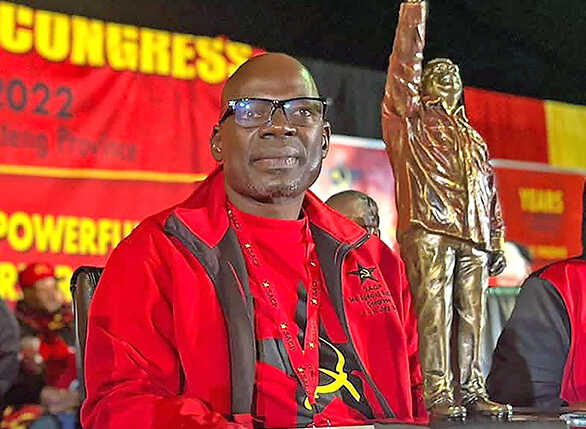The SACP broke new ground at its elective conference that concluded its business yesterday, with all positions except that of general secretary and first deputy general secretary contested.
Mainstay general secretary of the party, Blade Nzimande finally vacated the powerful position and his long-time deputy Solly Mapaila was elected unopposed.
However, other key positions were contested, breaking with the SACP’s long tradition of electing leaders by consensus.
Nzimande, who served on the central committee since 1994, was nominated by six provinces and the Young Communist League to become national chairperson.
Western Cape, Eastern Cape and North West led the resistance to the move, saying he had served his time and had to make way for others.
He was challenged by Gwebinkundla Qonde, the former director-general of the Department of Higher Education, Science and Innovation.
The two had a fallout out last year after Nzimande asked President Cyril Ramaphosa to suspend Qonde.
Nzimande painted a grim picture of the National Skills Fund, highlighting some of the worst audit outcomes and how Qonde and officials at the public entity could not account for irregular expenditure incurred since 2015.
Nzimande said when he heard that he was going to be challenged for the position of party chairperson, he told his supporters that he was not available.
“I have never contested for an official’s position in the SACP. I was feeling terrible and saying why can’t I move out with dignity? My saying goodbye the other day was emotional. And I was also overwhelmed by the response of congress. In a way they were saying ‘thank you, GS’,” he said.
Nzimande is one of the longest-serving general secretaries of the party, after Moses Kotane, who led the organisation from 1938 until his death in 1978. He had been at the helm of the organisation since 1998. In 1995, Nzimande was elected as deputy national chairperson and went on to act in the position.
“There is nothing wrong with contestation, it is part of the democratic process. But we always try to manage that. Usually those things tend to get out of hand. It allows opportunistic elements to want to come in. This is the lesson that the new central committee will have to refer to…”
His critics also said he would use the position of chair to outshine Mapaila and rule from the grave, an assertion he dismissed, saying he had worked with Mapaila for more than 30 years.
Nzimande said the highlights of his 24 years at the helm of the SACP included the financial sector campaign, which led to many poor South Africans being banked, the fight against state capture and the privatisation of SOEs.
Deputy Finance Minister David Masondo was elected unopposed as the party’s first deputy general secretary, while Mpumalanga’s Madala Masuka saw off a challenge from Eastern Cape’s Xolile Nqatha.
Labour Minister Thulas Nxesi retained his position as deputy chairperson, beating Nomalungelo Gcina. The SACP’s treasurer-general, Joyce Moloi-Moropa, also retained her position.
The SACP has often been accused of using its influence in the ANC to secure cushy government posts.
Many of the party’s leaders serving in its central committee were catapulted into the national executive as ministers and deputy ministers, MECs in provincial legislatures and as councillors following the party’s support for former president Jacob Zuma.
Nzimande reiterated that they did not regret supporting Zuma.
To read more political news and views, click here.
Follow @SundayWorldZA on Twitter and @sundayworldza on Instagram, or like our Facebook Page, Sunday World, by clicking here for the latest breaking news in South Africa. To Subscribe to Sunday World, click here.



